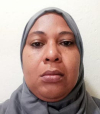Innocent kemigisha
ID: UNCST-2024-R003156
|
EVALUATING THE EFFICACY OF CONTINUOUS PROFESSIONAL DEVELOPMENT PROGRAMMES FOR TRAINERS IN TECHNICAL AND VOCATIONAL EDUCATION AND TRAINING IN UGANDA
REFNo: SIR423ES
iv. Determine professional development needs of TVET trainers in Uganda.,iii. Ascertain the challenges that were met when implementing these programs.,ii. Determine the impact of CPD on TVET trainers in Uganda.,i. Find out the features of the CPD programs that have been conducted for TVET trainers in Uganda.,The research will analyze continuous professional development (CPD) programmes for TVET trainers in Uganda to determine their effectiveness,
|
Uganda |
2025-03-14 18:05:40 |
2028-03-14 |
Engineering and Technology |
Non-Clinical Trial |
Degree Award |

|
Richard MIGISHA
ID: UNCST-2024-R002154
|
Enhancing Zoonotic One Health Engagement and Communication (ZOHEC) and Non-communicable diseases (NCDs) intervention in selected districts of Southwestern Uganda
REFNo: HS5420ES
To enhance the prevention, detection, and control of zoonotic diseases, diabetes and hypertension by strengthening risk communication, community engagement, surveillance systems, and the capacity of health workers, while fostering collaboration across human, animal, and environmental health sectors,
|
Uganda |
2025-03-14 18:02:18 |
2028-03-14 |
Medical and Health Sciences |
Non-Clinical Trial |
Non-degree Award |

|
Steven Bulega Elijah
ID: UNCST-2024-R003520
|
FACTORS ASSOCIATED WITH IMMEDIATE ADVERSE MATERNAL AND NEONATAL OUTCOMES OF OBSTRUCTED LABOR AT KAYUNGA REGIONAL REFERRAL HOSPITAL IN UGANDA
REFNo: HS5564ES
1. To identify the prevalence of obstructed labor at KRRH among women that delivered there from January to December 2023
2. To assess the factors associated with the immediate adverse maternal and neonatal outcomes of obstructed labor at KRRH among women that delivered there from January 2023 to December 2023
3. To explore the immediate adverse maternal and neonatal outcomes of obstructed labor at KRRH among women that delivered there from January 2023 to December 2023
|
Uganda |
2025-03-14 18:00:07 |
2028-03-14 |
Medical and Health Sciences |
Non-Clinical Trial |
Non-degree Award |

|
Lynn Atuyambe Atuyambe
ID: UNCST-2021-R012602
|
Exploring the facilitators and barriers of coverage, access, and use of HPV vaccination services among girls aged 10-14 years in Uganda
REFNo: SS3473ES
4. Determine the overall national performance of HPV vaccination in Uganda,3. Describe Uganda’s overall context of cervical cancer and HPV vaccination in cancer prevention and adolescent health,2. To document the challenges facing the least performing 12 districts, the interventions applied through the World Bank Group grant-funded activities,1. To explore the facilitators and barriers of coverage, access, and use of HPV first and second dose (full dose vaccination) services among girls aged 10-14 years in Uganda ,
|
Uganda |
2025-03-14 17:53:23 |
2028-03-14 |
Social Science and Humanities |
Non-Clinical Trial |
Non-degree Award |

|
Felix Oyania
ID: UNCST-2021-R013492
|
Impact of an outreach program on reduction of pediatric surgical disease in a refugee population
REFNo: HS5568ES
Aim 1: Evaluate the impact of an outreach program on reduction of pediatric surgical disease and averted disability (a) in comparison to a historical cohort (b).
Aim 2: Assess acquisition of knowledge and behavior change of refugee settlement healthcare providers in identifying and referring pediatric patients with surgically treatable disease.
|
Uganda |
2025-03-14 17:50:38 |
2028-03-14 |
Medical and Health Sciences |
Non-Clinical Trial |
Non-degree Award |

|
Wilber Sabiiti
ID: UNCST-2024-R016293
|
Field clinical evaluation of the NG-Test Point of Care lateral flow device (LFD) for monkeypox diagnosis in Uganda
REFNo: HS5602ES
To evaluate detection performance and clinical agreement of Rapid Point of Care (POC) antigen assay for diagnosis of mpox among clinically suspected patients in healthcare facilities in Kampala, Wakiso, Mukono, and Nakasongola districts in Uganda.
Specific objective 1
To determine the diagnostic sensitivity, specificity, & predictive values of the Rapid NG-Test antigen
assay in comparison to PCR and sequencing among patients with mpox
Specific objective 2
To identify MPXV clade (s) circulating among patients with mpox through virologic metagenomic
sequencing
|
Uganda |
2025-03-14 17:48:15 |
2028-03-14 |
Medical and Health Sciences |
Non-Clinical Trial |
Non-degree Award |

|
JOLLY KAKKAYI NYESIGIRE
ID: UNCST-2024-R004296
|
TALENT MANAGEMENT PRACTICES AND EMPLOYEE PERFORMANCE IN SELECTED PUBLIC UNIVERSITIES IN UGANDA
REFNo: SS3682ES
The objectives of this study are:
1. To examine the influence of talent attractiveness on employees performance in Public Universities;
2. To investigate the effect of talent motivation on employees performance in Public Universities;
3. To explore the effect of talent development on the performance of employees in Public Universities;
4. To establish the relationship between talent retention and employees performance in Public Universities.
5. To examine the moderation effect of employee commitment on the relationship between talent management practices and employee performance.
|
Uganda |
2025-03-14 17:45:15 |
2028-03-14 |
Social Science and Humanities |
Non-Clinical Trial |
Degree Award |
.jpg)
|
Victor Musiime
ID: UNCST-2021-R013794
|
A global phase 3, randomised, double-blind and placebo-controlled study evaluating the efficacy and safety of etavopivat in adolescents and adults with sickle cell disease
REFNo: HS5637ES
1. To demonstrate superiority of
treatment with etavopivat
versus placebo in adolescents
and adults with SCD.
2. To evaluate clinical efficacy
measures of etavopivat treatment
versus placebo in adolescents
and adults with SCD
3. To assess clinically meaningful
improvement in fatigue and
functional exercise capacity
and QOL measures of
adolescents and adults with
SCD taking etavopivat
treatment compared to placebo
|
Uganda |
2025-03-14 17:26:26 |
2028-03-14 |
Medical and Health Sciences |
Clinical Trial |
Non-degree Award |

|
UMI BUNU OMAR
ID: UNCST-2024-R002604
|
ASSESSMENT OF THE IMPACT OF SUBSTANCE OF ABUSE AMONG YOUTH IN BUSHENYI DISTRICT, WESTERN UGANDA.
REFNo: HS5415ES
i) Determining the prevalence and associated factors of substance of abuse among youth in Bushenyi District, Western Uganda.
ii) Assess the patterns of abused substances among the youth in Bushenyi District, Western Uganda.
iii) Determine the impact of substance of abuse on the youth in Bushenyi District, Western Uganda.
iv) Evaluate interventions implemented against abused substances among youth in Bushenyi District, Western Uganda
|
Kenya |
2025-03-14 16:57:28 |
2028-03-14 |
Medical and Health Sciences |
Non-Clinical Trial |
Degree Award |

|
Francis Okello
ID: UNCST-2019-R000024
|
Understanding the economic impact of universal household hand hygiene in children under five in Uganda
REFNo: HS3181ES
To explore the health inequality impact of providing alcohol-based hand rub to mothers enrolled in the Babygel trial.,To determine the association between catastrophic health expenditure and under-five mortality in Uganda.,To estimate the extent to which handwashing with soap offers financial risk protection from out-of-pocket expenditure for treatment of diarrheal disease in children under five in Uganda. ,The main objective is to assess the benefits of household hand hygiene practices in terms of financial risk protection and reduction of health inequality. Furthermore, we will explore the association between under-five mortality and catastrophic health expenditure.,
|
Uganda |
2025-03-14 16:38:36 |
2028-03-14 |
Medical and Health Sciences |
Non-Clinical Trial |
Degree Award |

|
Margaret Nagawa
ID: UNCST-2022-R009705
|
EARLY NUTRITIONAL INTERVENTION FOR NUTRITIONALLY AT-RISK INFANTS UNDER 6 MONTHS OF AGE TO REDUCE MALNUTRITION IN THE FIRST YEAR OF LIFE
REFNo: HS3503ES
5. To assess the maternal and health worker perceptions on the integrated intervention package.,4. To assess the effect of an early integrated family intervention program for LBW and undernourished children u6m on growth in the first year of life.,3. To understand the barriers and facilitators to the integration of maternal mental health care and community-based management of malnutrition in infants u6m of age.,2. To assess the prevalence of maternal mental health among caregivers of u6m infants.,1. To determine the factors associated with malnutrition among infants u6m of age and challenges caregivers of LBW and undernourished infants face. ,2. To assess the prevalence of malnutrition among infants u6m and their associations, To assess the effect of an early integrated nutrition intervention for nutritionally at-risk infants u6m of age in reducing malnutrition in the first year of life. ,
|
Uganda |
2025-03-14 16:37:34 |
2028-03-14 |
Medical and Health Sciences |
Clinical Trial |
Degree Award |

|
Joseph Mukasa
ID: UNCST-2024-R015786
|
Youth with Disabilities in Local Government Development Implementation: Exploring the Inclusivity of Mainstream Livelihoods Programmes in South-Western Uganda
REFNo: SS3674ES
The objectives of the research project are to:
1.Conduct a scoping review on the inclusion of youth with disabilities in mainstream livelihood programmes.
2.Determine the participation of youth with disabilities in the implementation of mainstream livelihood programmes.
3.Investigate the factors influencing the inclusion of youth with disabilities in mainstream livelihood programmes.
4.Explore the role played by Organisations of Persons with Disabilities in promoting the inclusion of youth with disabilities in mainstream livelihood programmes.
5.Propose a framework for practicing disability inclusive youth livelihoods development in local government.
|
Uganda |
2025-03-10 18:06:19 |
2028-03-10 |
Social Science and Humanities |
Non-Clinical Trial |
Degree Award |

|
OKELLO DAMOI JOSEPH
ID: UNCST-2022-R011560
|
EFFECT OF VIDEO-BASED PATIENT EDUCATION ON PATIENT ANESTHESIA, ENDOSCOPY LITERACY, AND SHOW-UP FOR THEIR INTENDED PROCEDURES AT KYABIRWA SURGICAL CENTER – JINJA CITY
REFNo: HS4465ES
To evaluate the effect of video-based education on surgical procedure attendance among patients at Kyabirwa Surgical Center ,To evaluate the effect of video-based education on the level of patient knowledge about endoscopy among patients at Kyabirwa Surgical Center,To evaluate the effect of video-based education on the level of patient knowledge about anesthesia among patients at Kyabirwa Surgical Center,To determine the level of patient knowledge about, and uptake of their scheduled procedure after reception of conventional and video-based patient education at Kyabirwa Surgical Center,The goal of this research is to evaluate the effect of video-based education on patient literacy about endoscopy and anesthesia, and surgical procedure attendance (show up) at Kyabirwa Surgical Center, Jinja.,
|
Uganda |
2025-03-10 18:03:34 |
2028-03-10 |
Medical and Health Sciences |
Non-Clinical Trial |
Non-degree Award |

|
Dithan Kiragga
ID: UNCST-2024-R004458
|
Project Evaluation Protocol for the ACE-BUNYORO Project, Titled: “Accelerating and Sustaining HIV Epidemic Control and Related Diseases in Hoima (Bunyoro) Region in the Republic of Uganda under the President's Emergency Plan for AIDS Relief (PEPFAR)” _{ACE-Bunyoro}.
REFNo: HS5579ES
Evaluation objectives: The evaluation will assess;
a) The extent to which the project achieved its specific objectives as stated in the grant application. b) The relevance of ACE Bunyoro project in i) accelerating and sustaining HIV epidemic control
and strengthening regional, district, and community system capacities to achieve and sustain
HIV epidemic control, as perceived by government, district, health facility and project stakeholders, ii) addressing the health needs of its direct beneficiaries (clients) in Bunyoro region
c) The potential for sustainability of project components, results achieved and other efforts aimed at achieving HIV epidemic control in Bunyoro region.
|
Uganda |
2025-03-10 18:01:54 |
2028-03-10 |
Medical and Health Sciences |
Non-Clinical Trial |
Non-degree Award |

|
Laura Munro Catherine
ID: UNCST-2025-R016668
|
Investigating the differences in bark feeding behaviour between two wild chimpanzee communities
REFNo: NS918ES
1. To provide new insights into the potential environmental and social drivers of self- medication behaviour in wild chimpanzees, and specifically examine whether community plays a role
2. To provide further evidence of self-medication behaviour in chimpanzees at BCFS
3. To produce more accurate forest compositional data of BCFS for future research and
conservation purposes
4. To add to the evidence of urinalysis as an effective non-invasive health monitoring
method for wild chimpanzees
|
UK |
2025-03-10 17:57:11 |
2028-03-10 |
Natural Sciences |
Non-Clinical Trial |
Degree Award |

|
Mark Buntaine Thomas
ID: UNCST-2024-R015926
|
Empowering Local Communities to Oversee Waste Management Services
REFNo: SS3614ES
The open burning of household waste is a major public health challenge throughout the Global South, since it creates a direct route of exposure to concentrated air pollution. One reason why people turn to open burning is that the collection of household waste is unreliable. In the context of our study (Nansana Municipality / Wakiso District), municipal and district governments write contracts with private companies to collect waste from specific neighborhoods, but have trouble overseeing those contracts to ensure that pickup schedules are appropriate and that services are reliable. This prevents residents from using services and creates barriers to meeting national goals of reducing the informal disposal of plastic wastes.
We will conduct a randomized experiment where the treatment will involve granting authority for the oversight and monitoring of waste services to zones (LC1s), which are the lowest level jurisdiction in Uganda. Specifically, we will provide training to chairpersons in treated zones about (1) new authority for oversight of contractors, including the ability to recommend dismissal of existing contractors who do not meet their obligations; and (2) new responsibilities for recommending contractors in the case of openings. The control zones will continue to have their waste collection contracts centrally managed by municipal or district authorities. Decentralizing authority for waste management may improve the fit of contracts to local conditions. However, the devolution of oversight authority may also raise risks of inefficiency and decreased professionalism in management.
We will build upon a previous project with the Nansana Municipal Government and utilize a vetted data collection protocol for measuring informal waste disposal (Buntaine et al. 2024). We will conduct transects through both treatment and control neighborhoods to document the amount of household waste that is disposed informally. The key outcome targeted in the experiment is a decrease in the informal disposal of household waste. We will specifically evaluate whether decentralizing oversight authority decreases the amount of solid waste that is burned in sample zones. Our project aligns with national priorities to decrease the informal disposal of plastic waste.
|
USA |
2025-03-10 17:55:47 |
2028-03-10 |
Social Science and Humanities |
Non-Clinical Trial |
Non-degree Award |

|
Okello Eri
ID: UNCST-2024-R016563
|
SUPPLY CHAIN MANAGEMENT PRACTICES, MARKETING STRATEGIES AND FINANCIAL PERFORMANCE AMONG CEMENT MANUFACTURERS IN TORORO, UGANDA
REFNo: SS3632ES
i. To determinethe effectof inventory management on financial performance among cement manufacturers in Tororo, Uganda.
ii. To assess the influence of logistics management on financial performance among cement manufacturers in Tororo, Uganda.
iii. To examine theeffectof customer relationship management on financial performance among cement manufacturers in Tororo, Uganda.
iv. To evaluate the effect of supply chain integration on financial performance among cement manufacturers in Tororo, Uganda.
v. To analyze the moderating effect of marketing strategies on the relationship between supply chain management practices and financial performance among cement manufacturers in Tororo, Uganda.
|
Uganda |
2025-03-10 17:53:25 |
2028-03-10 |
Social Science and Humanities |
Non-Clinical Trial |
Degree Award |

|
Evelyn LanyeroGrace
ID: UNCST-2024-R016478
|
Factors influencing attrition in online continuous professional development in National Teachers Colleges in Uganda
REFNo: SS3645ES
i. To examine the individual, external and internal factors contributing to attrition in Online Continuous Professional Development programs among lecturers in National Teachers' Colleges in Uganda.
ii. To explore time related challenges that influence attrition in online CPD programs among lecturers in National Teachers' Colleges in Uganda
iii. To identify effective strategies for reducing attrition in online CPD programs among lecturers in National Teachers' Colleges in Uganda
|
Uganda |
2025-03-10 17:50:17 |
2028-03-10 |
Social Science and Humanities |
Non-Clinical Trial |
Degree Award |

|
Elly Katsigaire Atuhereze
ID: UNCST-2024-R002236
|
INSTITUTIONAL CAPACITY AND SUCCESS OF SAVINGS AND CREDIT COOPERATIVE SOCIETIES (SACCOs) IN MBARARA DISTRICT
REFNo: SS3619ES
1. To investigate the institutional capacity functions of SACCOs in Mbarara district
2. To examine the effectiveness of SACCOs in addressing the financial needs of members in Mbarara District.
3. To examine the moderating effect of Non-Banking Financial Policy on institutional capacity and success of SACCOs in Mbarara District
|
Uganda |
2025-03-10 17:48:51 |
2028-03-10 |
Social Science and Humanities |
Non-Clinical Trial |
Degree Award |

|
Eve Katushabe
ID: UNCST-2023-R006183
|
Experiences and Satisfaction of Mothers and Midwives for Intrapartum Care Services in South Western Uganda: A mixed methods study
REFNo: HS5048ES
1. To determine the mothers’ level of satisfaction with intrapartum care services in South western Uganda 2. To identify the factors influencing the mothers’ level of satisfaction with intrapartum care services received in South western Uganda 3. To understand the quality of intrapartum care services provided by the midwives in selected health facilities. 4. To explore mothers’ experiences of intrapartum care services in South western Uganda. 5. To explore midwives’ experiences of providing intrapartum care services in South Western Uganda
|
Uganda |
2025-03-10 17:35:19 |
2028-03-10 |
Medical and Health Sciences |
Non-Clinical Trial |
Degree Award |

|
| View |
|
Sort By: |
|
|
|
| |
|